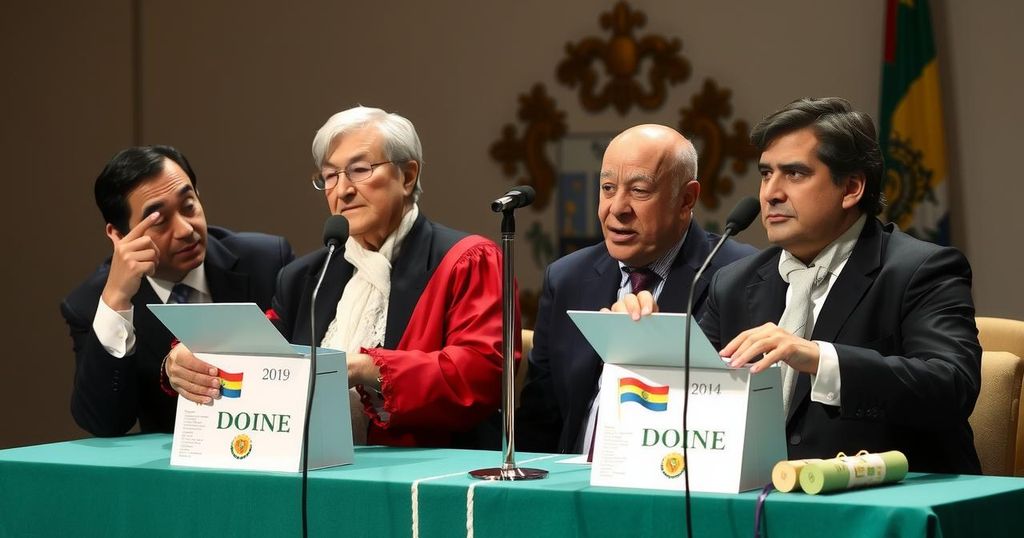Bolivia is preparing for a divisive popular vote to elect its top judges, a process criticized for turning the judiciary into a political prize rather than a platform for upholding the rule of law. This vote reflects broader tensions within the ruling party and raises questions about the integrity of judicial elections in strengthening democracy. Observers note that low voter turnout and a lack of awareness among citizens characterize this controversial electoral practice, while the impact may resonate throughout Latin America as similar reforms unfold in countries like Mexico.
Bolivia is set to conduct a controversial popular vote for selecting its top judges, a process that many believe has turned the judiciary into a political battlefield. Though campaigning is officially prohibited, candidates have found creative ways to promote themselves, leading to voter apathy and skepticism about the integrity of the elections. Critics assert that judicial elections, premised on the idea of enhancing democracy, have resulted in a politicized judiciary lacking impartiality. Judicial appointments were intended to ensure qualifications and independence but have devolved into political bargaining, raising concerns regarding the potential undermining of democratic principles across Latin America.
The current election marks the third instance of judicial voting in Bolivia, following similarly problematic elections in 2011 and 2017. Voter turnout has historically been low due to the public’s discontent with a system perceived to be heavily manipulated by political elites. In recent months, tensions have surged as President Luis Arce’s administration faced accusations from supporters of former President Evo Morales, who alleged that Arce was enacting measures to extend friendly judges’ mandates out of fear, exacerbating political factionalism within their party.
As the elections approach, the internal strife within the ruling Movement Towards Socialism party persists, underscoring how pivotal control over the judiciary has become for political survival. Furthermore, the Inter-American Court of Human Rights has expressed concerns over the potential adverse effects of delaying elections on judicial independence.
This upcoming vote will only fill four of the nine seats on the Constitutional Court, preserving the influence of existing judges and igniting further criticism regarding the legitimacy of a process promising reform yet yielding little substantive change. Amidst this chaos, the election is viewed with trepidation, as those aware of the looming implications on democracy in Bolivia watch closely.
The outcome of the Bolivian judicial elections may serve as an important case study for neighboring nations, particularly as Mexico prepares to embark on a similar path of judicial restructuring. How Bolivia navigates this convoluted electoral process could greatly influence the impending judicial election landscape across Latin America.
Bolivia has frequently been in the spotlight due to its unique system of electing judges through popular vote, which is unlike most countries where judges are appointed or nominated based on expertise and training. This system was embraced in 2009 under the presidency of Evo Morales, who portrayed it as a democratic reform aimed at diminishing corruption and enhancing public faith in the judiciary. However, the reality has shown that these elections have often been plagued by political maneuverings, eroding the independence that a judicial system requires. Critics argue that public elections for judges contribute to the politicization of the judiciary, undermining its role as a neutral arbiter of justice and posing threats to democracy in the region. In light of this situation, other countries such as Mexico are observing Bolivia’s approach as they consider respective judicial reforms.
Bolivia’s impending popular vote for its judiciary encapsulates a complex mixture of political maneuvering, public disillusionment, and concerns about judicial integrity. As the electoral process unfolds, challenges related to voter engagement and the implications for judicial independence remain paramount. The situation serves as a critical indicator for other Latin American countries contemplating similar electoral reforms within their judicial systems. Observers will closely monitor the outcomes, which may inadvertently shape regional approaches to justice and democracy.
Original Source: apnews.com






